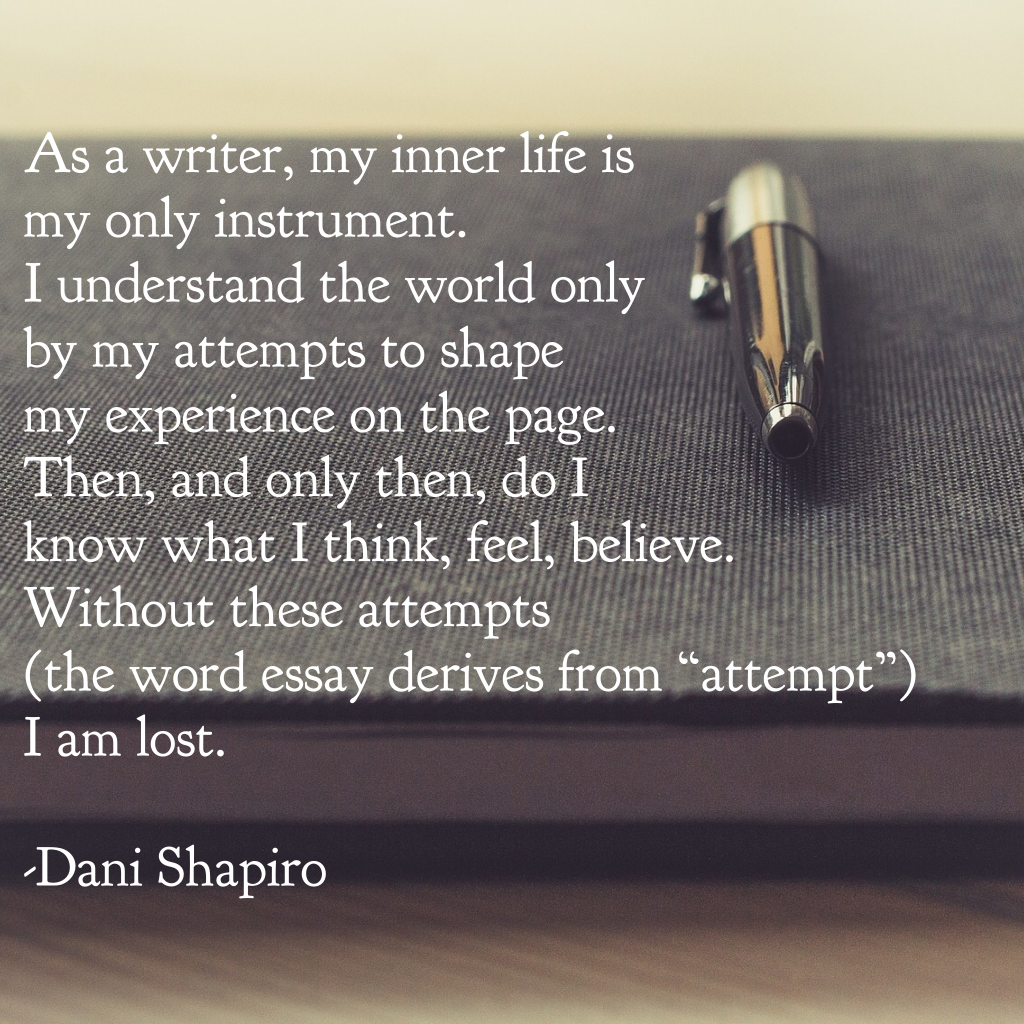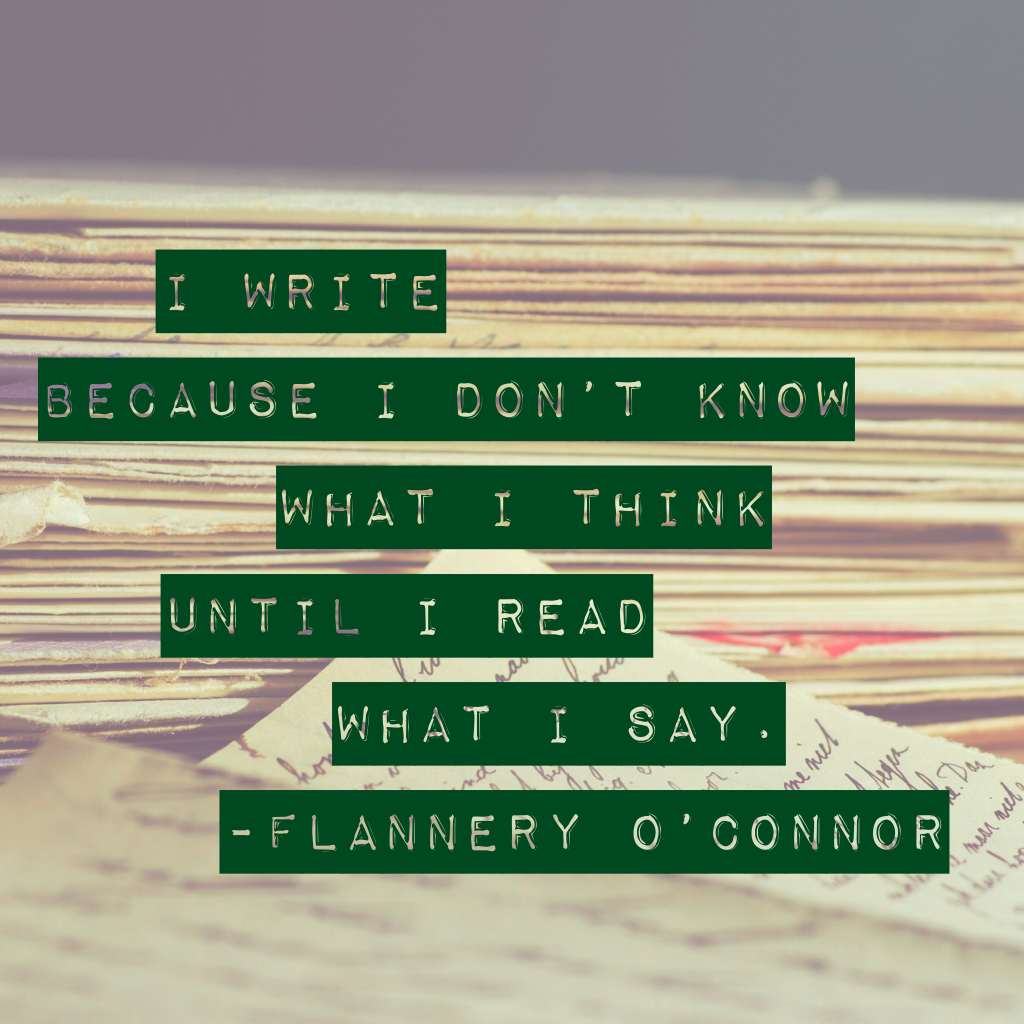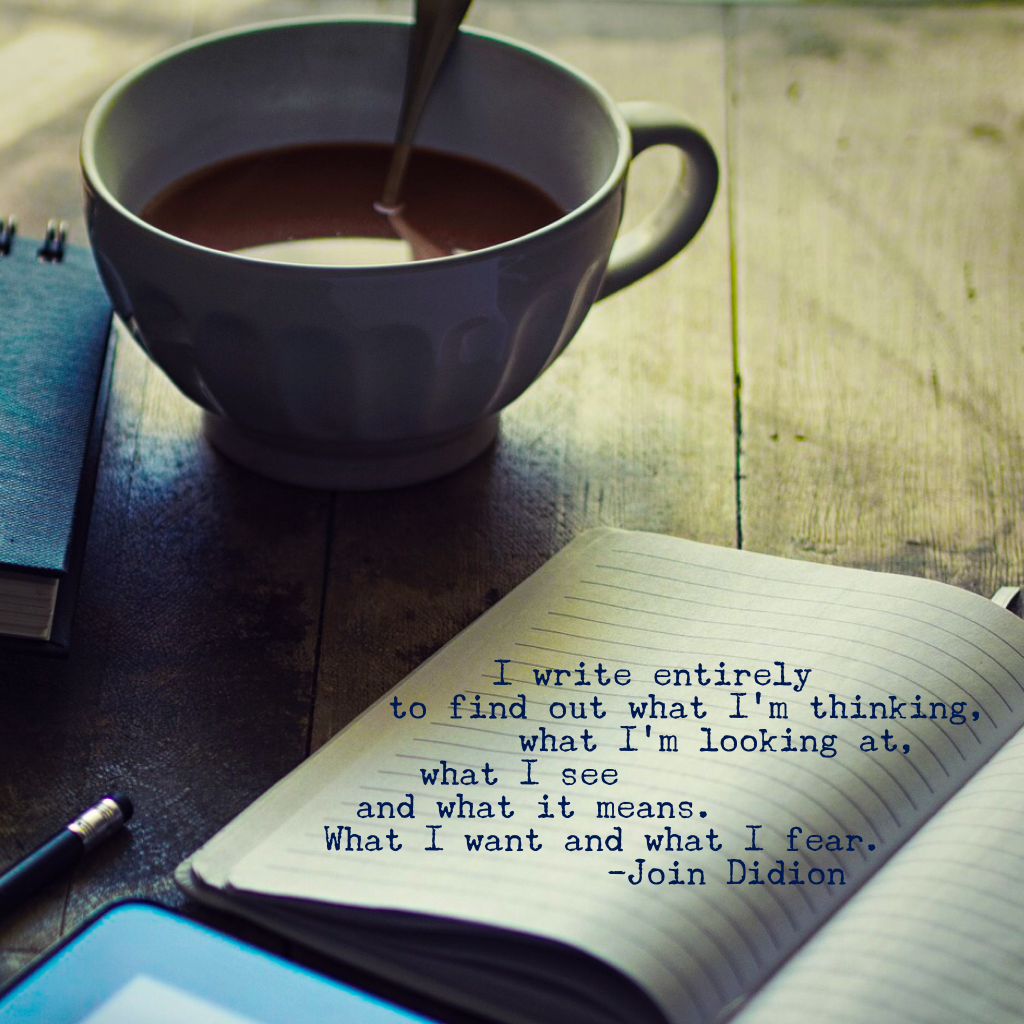
BLOG
A story from the cave beneath the mountain of marketing and spin
Sovereign Standard, Issue 39 Right now, every fiber of my being (except for the fibers that are occupied with holding a toddler on my hip as I help my first-grader make turkeys out of candy corns and Oreos) is occupied with story.
Right now, every fiber of my being (except for the fibers that are occupied with holding a toddler on my hip as I help my first-grader make turkeys out of candy corns and Oreos) is occupied with story.
What does it take to translate the thoughts and emotions and in-process “stuff” into a story that engages, reveals collective insights, and exposes truths?
I don’t have the whole answer yet, but I’m getting closer.
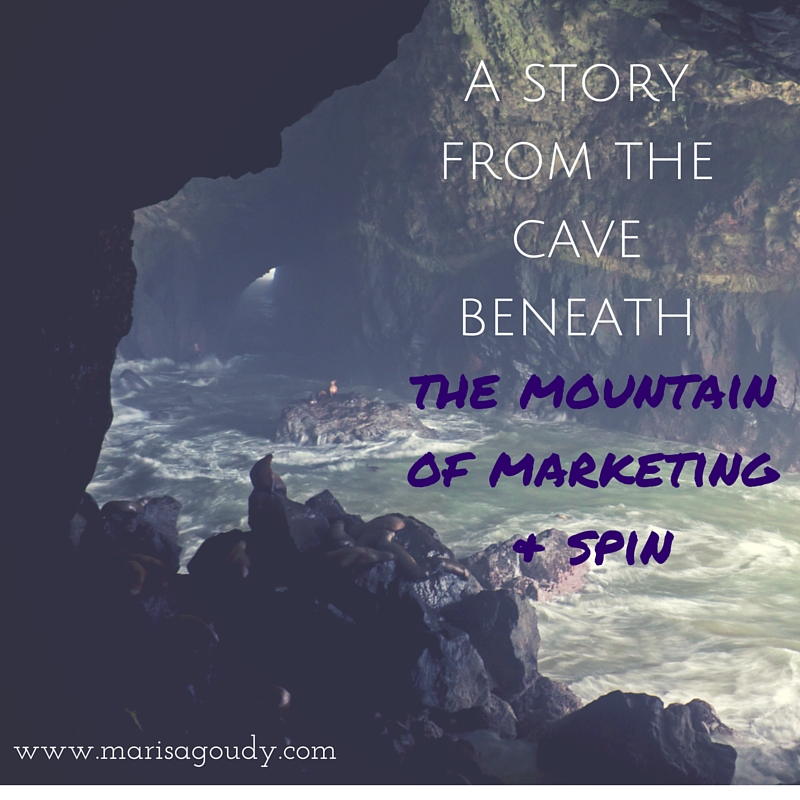 The best writing begins in private
The best writing begins in private
To allow myself the true freedom to wonder and wander, I’m dialing back my public writing. I've been pulling deep inside to where the really stories live. It's the place deep below the marketing and the spin - in the caves where the truth rubs elbows with fear and dreams struggle against despair.
[tweetthis]Story is born in caves where the truth rubs elbows with fear & dreams struggle against despair.[/tweetthis]
In a world where storytelling is celebrated as an art and foisted upon us as a marketing tactic, it’s easy to get burned out on story - particularly when you feel like you weren’t blessed with the Scheherazade gene.
I do believe that “everybody has a story” because it was reality long before it was a cliche (or the theme of a zillion ad campaigns). But there’s a lot more to unlocking natural storytelling abilities than shoving a mic or a blog password into someone's hand and commanding “have the courage to tell your story.”
The alchemy of turning "your stuff" into "Your Sovereign Story"
As 2015 dims to allow the new year to shine bright, I’ll have a great deal to say - and to offer - about this alchemical process of turning “your stuff” into “Your Sovereign Story.”
In the meantime, please give yourself permission to slow down and watch out for the unforgettable characters and plot twists (especially those who show up around your Thanksgiving table).
Begin to consciously collect the experiences that will give your stories life... I'll be back soon to help you figure out what to do with the material!
To fight or to heal: the power of word choice
Sovereign Standard, Issue 37 “Write as you speak.”
“Write as you speak.”
Generally, this is the right advice when someone is stuck in academic or clinical writing mode or just can figure out what to say.
Like most advice, you need to decide if it applies to you before you even consider taking it to heart.
You probably don’t really want to write as you speak.
Not if you’re prone to the occasional f-bomb. Not if you’re the kind of person who stops herself mid-ramble with “oh, am I still talking?” Not if you pepper your speech with expressions that need to be heard aloud to be understood.
You can say that, but you might not want to be quoted
Even when speaking with clients, you aren’t nearly as mindful of your words as you must be when you publish on a professional website or enter an online conversation with group of colleagues.
After all, when you put ideas into text, you don’t have tone and gesture to rely on. The words just sit there, waiting to be interpreted by the reader.
How challenging! How terrifying!
Your metaphors create your writing’s tone of voice
We use most of our metaphors and expressions unconsciously. And we can say some brutal things without even realizing it.
Common phrases become so familiar that they lose important aspects of meaning.
Everyone knows what “rule of thumb” means when it’s used to discuss a general guideline of some kind, but how many of us remember this phrase’s origins? It actually refers to the width of the stick a man could legally use to beat his wife.
As a healing professional, as a creative entrepreneur dedicated to making the world more beautiful, bearable, and bold, the last thing you want to do is promote violence.
But are you accidentally injecting words of warfare and conflict into your writing?
The everyday violence in our language and in our world
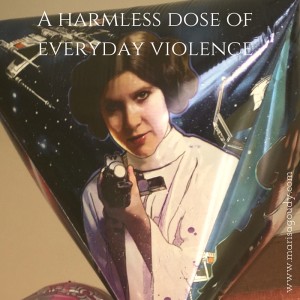 If you are using violent images without thinking about it, you’re not alone.
If you are using violent images without thinking about it, you’re not alone.
I definitely just bought a balloon with guns all over it for my six year-old daughter's birthday. In my defense, "Because Princess Leia and Han Solo" seems to sidetrack many conscious moms and dads' dedication to peaceful parenting. But the casual injection of violence is not just a Star Wars blind spot.
Writers are trained to take their readers prisoner.
Writers are told that they must “grab” or “hook” or “capture” the reader. But think about those metaphors. Their theme is violence and compulsion. They suggest a relationship you might want to have with a criminal, not a reader. - Tracy Kidder and Richard Todd, Good Prose
Marketers are groomed to force themselves upon you.
A testimonial is “punching people in face with value. - David Newman, Do It! Marketing: 77 Instant-Action Ideas to Boost Sales, Maximize Profits, and Crush Your Competition
People suffering from disease are told to arm up.
Join the fight to kill cancer. - United Cancer Foundation
Sometimes, you want to be a warrior
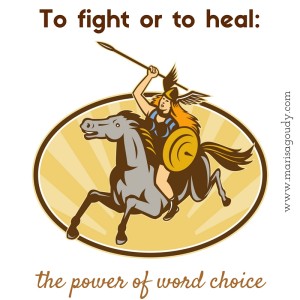 I’m not arguing that we need to become complete pacifists.
I’m not arguing that we need to become complete pacifists.
There are days when I need to enter my “warrior woman” mindset to get through the day despite the exhaustion, the stacks of dirty dishes, and the endless demands of a business that relies completely on my own ability to show up and do the work.
As long as no one gets hurt, I’m ok with writing into what Traditional Astrologist Molly Morrissey calls the “Mars energy” and using every martial word in my arsenal to combat grime, dirt, mold, stains, waste, and weeds (thanks, MKN!).
And sometimes, words do cause harm
In Having cancer is not a fight or a battle, Kate Granger asks “Why is military language used to describe cancer? These words are meant to help patients but can have the opposite effect."
I refuse to believe my death will be because I didn't battle hard enough.
Your writing matters. There are no throwaway phrases.
Don’t let a fear of offending readers you’ve never met keep you from writing and publishing. Trust yourself and trust your own good intentions.
Allow your shoddy first drafts to clunk with cliches. Mix your metaphors with wild abandon until you settle on the unifying image that ties together a section or an entire piece.
Don’t be afraid to step into the trenches and give it your best shot. But just be aware, by the time you reach your final version, you might want to say you engaged deeply with the experience and did your best.
Often, a warlike metaphor is best replaced by a straightforward truth.
Let's make our shared discourse a little more conscious and peaceful. Please share this post and subscribe to receive the Sovereign Standard each week.
“I don’t have time to write!”: the Tough Love Answer and the Soul-Level Response
 Sovereign Standard, Issue 35
What’s the reason why people get this close to inviting me to be their writing coach and then press the pause button?
Sovereign Standard, Issue 35
What’s the reason why people get this close to inviting me to be their writing coach and then press the pause button?
“I really want to give this content creation process the attention it deserves, and I am just not ready to do that yet.”
Whether you're looking to hire a writing coach and editor or whether you're working solo on all the website content, blog posts, and guest posts, you feel the same pressure: “I don’t have time to write!”
The tough love answer to “I don’t have time to write”
 Because I like you, I will tell you that, even as a writer, I understand this squeeze. Granted, for me the problem is “I don’t have time to write enough,” but the principle is the same.
Because I like you, I will tell you that, even as a writer, I understand this squeeze. Granted, for me the problem is “I don’t have time to write enough,” but the principle is the same.
There’s so much you want to say, so much that you want to explore… there just aren’t enough hours in the week.
And because I love you, I'll listen to your “not enough time!” lament. Then I will then ask you what your goals are - professionally, creatively, personally.
You’ll think I’m changing the subject and giving you a chance to tell me about all the other really neat stuff that’s more important than your writing practice including your plans to:
- Start a podcast
- Build a membership group
- Develop a product and make money while you sleep (finally!)
- Work your way to Oprah’s couch (because it’s the goal even when you need cable to see it)
I will be so excited to hear about everything you've got cooking! And then I am going to say, because I really believe you have valuable insights that will earn you income and recognition: but how are you going to manifest all that without a writing practice?
Praying that you don’t think I’m telling you to put your dreams on hold while you do something "impossible" (dedicate three hours or more per week to the process of writing), I will remind you:
- A powerful podcast grows thanks to the strength of its show notes and the written content that attracts readers and converts them into listeners.
- A membership group that is all audio or video based will disappoint people who prefer to read information and it will never be a fully searchable, useful resource for anyone.
- Even a sound and visual-based product needs a written component too - and it needs to be marketed with rich content that tells a story.
- Last time I checked, the way people like you and me get on Oprah is by writing a really awesome book.
The soul-level response to “I don’t have time to write!”
“Because it will forward my business” and “because I need to boost my visibility to share my message” - these are great reasons to develop and stick with a writing practice.
But are knowing it's good marketing strategy and understanding my points above really enough to get you to set writing dates with yourself?
"Because entrepreneurship" has never been a strong enough reason to get me to show up to this blog week after week. No promises of big money or fame has inspired me to fill all those little black journals.
There has to be something more to this writing thing. There's a deeper value that compensates the time and the energy and the devotion you must lavish on the writing process.
But, of course, a writer says writing is "the thing"
Now, taking writing advice from a writer - someone who needs to write to make sense of this heartbreaking, ecstatic work of being alive - it’s a dicey thing.
Admittedly, I’m a person who would ask a dozing seatmate on a packed New York City commuter train for a pen because a 90-minute trip without writing implement is unendurable.
It's good to have crazy scribes like me out there (unless you're a cranky commuter). We're here to do the writing for you, right?
The copywriters and the writing coaches in the world - we're good, but we're not that good. We can help you get clear on what you really want to say. We can make you look good on paper. We can empower you to feel like a "real" writer and not just somebody blogging for attention.
But, you need to touch the words at some point in the process. You cannot outsource the practice of writing itself - the discipline of it, the ritual of it, the insights and serendipitous connections that spring from it. Well, you could, but then you'd miss out on all sorts of untold magic.
When you delegate the entire writing process you lose tremendous opportunities to explore and expand your own thoughts. As a creative entrepreneur, as a clinician or healer who wants to make a difference in the world - you need access to your own brilliance.
Writing gives you a direct path into your own most vital wisdom.
Writing = thinking, understanding, feeling
Need some inspiration to turn the writing chore into a writing practice? Meet Saundra Goldman and her #continuouspractice project and join the community of people who show up each day to the practice that matters.
Ready to make time for the writing your business needs you to do? Let's talk about how writing coaching can help you create a practice that works for you.
And, even though my "brave" writing is mostly being confined to my journal, I'm still inspired by the Bravery Blogging Project. This week, it felt courageous to ask other great writers to speak for me!
Can you be vulnerable and write “I don’t know” on your business blog?
Sovereign Standard, Issue 34 The writer looks like she is sitting at a keyboard or scribbling furiously in a journal. She seems to be occupying the same space and time as everyone else in the room, but, in reality, she’s exploring territory that she can explain, but never let you view directly.
The writer looks like she is sitting at a keyboard or scribbling furiously in a journal. She seems to be occupying the same space and time as everyone else in the room, but, in reality, she’s exploring territory that she can explain, but never let you view directly.
Whether it’s fiction or theory or even marketing copy that comes from the heart, she’s deep in her own inner landscape. This marvelous space is only limited by the scope of her own imagination and knowledge.
This private world is not infinite. Instead, it’s an eternally elastic territory. The borders are pushed outward by everything she learns and by every experience that invites her to grow.
And yet, there are limits. The writer will reach her edge. Then what?
The Blogger’s Dilemma: The Question Without an Easy Answer
When I worked on the first draft of this week’s blog post, I found myself writing into a question without an answer.
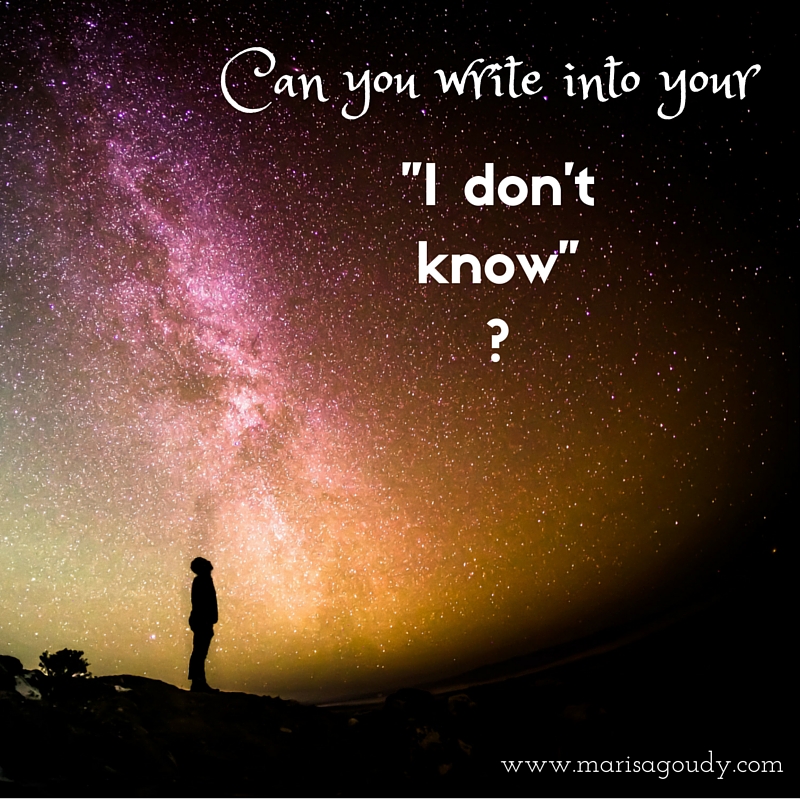 It was something so close to my “expertise” that I was shocked when I hit a big “I don’t know…”
It was something so close to my “expertise” that I was shocked when I hit a big “I don’t know…”
Often the best questions don’t have ready answers - that vast unknown is the seed of a book, a career, or a life's passion. By the same token, the best blog posts don't necessarily follow the "proven" formulas.
But, in my case, it felt like I should have an answer (and I don’t even let myself use the word should). After all, I was writing about storytelling and this was “just” a blog post… Finding myself at the edge of my frontier of knowledge was as unexpected as it was unsettling.
Sitting quietly in front of a Word doc, I felt uncertain and exposed.
I felt horribly vulnerable - even though no one ever needed to know that there was something really important about storytelling I couldn’t write about with ease.
And then, the magic of the writing practice kicked in: describing the view from my own intellectual edge became more important than the expertise I thought my readers would need.
This is the Vulnerability Business, right?
Last week’s post was about being in the vulnerability business. If you seek to transform lives and make this world more beautiful, bearable, or bold, you have a stall in the marketplace of vulnerability.
You hold space for your clients’ shame and uncertainties. And you strive to recognize vulnerability when you see it - starting with your own.
The writing process gives you a perfect window into your own vulnerabilities. After all, it’s about showing people how you organized ideas and crafted them to be understood by others. It's about being seen.
Something that wasn’t in the last post - writing can also expose what you might perceive as your “weaknesses.”
Remember, before Brené Brown taught us that “Vulnerability is the birthplace of love, belonging, joy, courage, empathy, and creativity,” most of us just equated vulnerability with weakness.
The gift of “I don’t know”
That unexpected “I don’t know” dropped me into the “fraud, fraud, fraud” pit. I’m sure I needn’t tell you that no decent writing has ever been produced in that despairing hell hole.
Let’s take a moment here to celebrate one of the many gifts of the writing practice: you can write your way through despair all the way to retrospect - sometimes in the same writing session!
Now, I can see “I don’t know” as a tremendous gift.
It’s an invitation to see things in a new way. It’s an opportunity to forgive myself for being a mere mortal who is still learning every day. It’s a chance to hit pause and do some really delicious research - and perhaps even read those books on writing that I love to buy but never have time to read (because it would eat into writing time, of course).
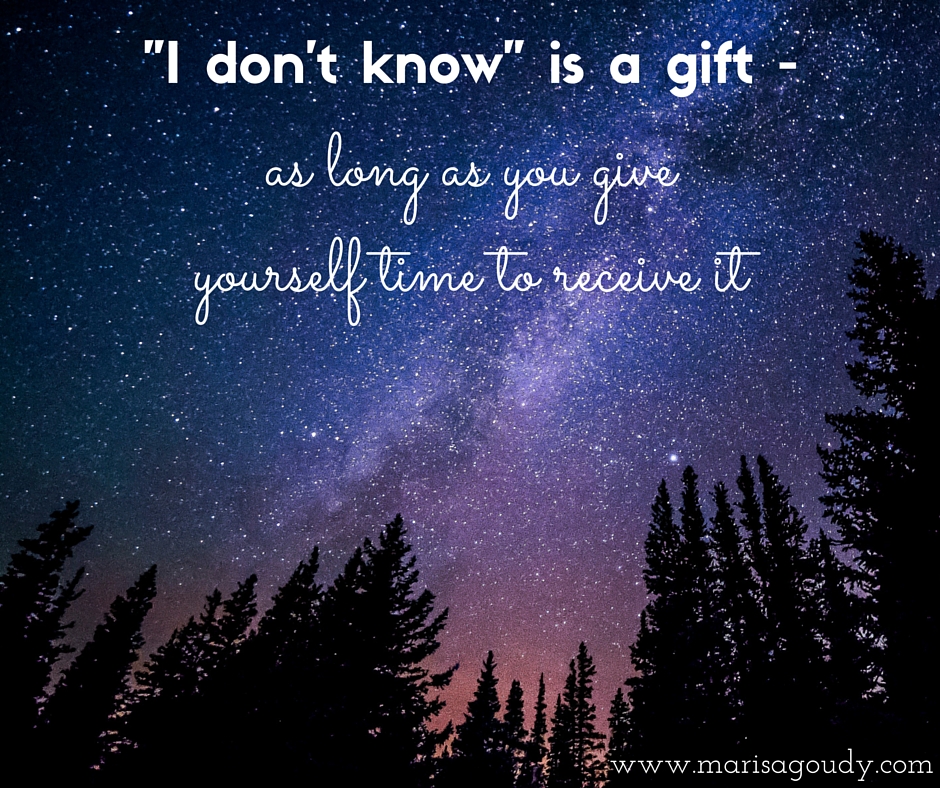 But what if you don’t have time receive the “I don’t know” gift?
But what if you don’t have time receive the “I don’t know” gift?
New perspective, self-acceptance, mindful pauses. Lots of people tell you how wonderful they are.
Truth is, it is hard to see all the opportunities in “I don’t know” when you simply don’t have the time to wander and wonder and expand the bounds of the known world.
There is only so much writing time per week. This time is not meant to be lavished on research or stumbling into terra incognita. It’s not meant to be spent on Facebook either, but that's another story.
So, what happens when you write yourself into an "I don't know" shaped corner but you just need to hit publish?
4 Ways a Writer Can Respond to an Unexpected “I Don’t Know”
Research. The universe just may be telling you that it IS ok to skip this week’s post and put your writing time into developing your own answer to that big, scary question.
(Admittedly, this week I told the universe I would get back to it about expanding my mind after I found a way to write something worth publishing, baked cupcakes for my 6 year-old’s birthday, and finished the outline for my new membership group. This may be an instance of “do as the writing coach says, not as she does.”)
Release. “Release” may be about skipping or delaying a post (see above). Losing sleep or publishing something that isn’t ready just because it’s supposed to be on the editorial calendar is never in your best interest.
(Personally, I find it almost impossible to break the publishing promise I've made to myself. I often choose to understand “realease” as letting go of the troublesome topic and allowing another idea to emerge.)
Repurpose. Look back at past posts, particularly material that appeared on old websites or on guest blog posts. Redo the intro and the conclusion and let yourself off the “must create original material” hook. Remember: this is always an option.
(Do you even remember what you wrote last year? Chances are there's real gold there. Looking back to your past posts isn't cheating - it's using all your resources wisely.)
Reach out. As I wrote this late into Wednesday night, I whined to my husband about being stuck in the blogging vortex. While I was happy that I had been able to release the original idea and repurpose the feelings that “I need to do more research” stirred up, I had well over 2000 words of wandering wonder. All I wanted was an intro, some useful content, and a compelling Invitation to Action! That was when the light went on - if only I had a writing coach!
All day long, I look at clients’ snarled up brilliance and help them pluck out the brightest, most evocative ideas and stories. It’s nearly always impossible to get perspective on your own work. If you can relate to this story, reach out to me and we’ll see how I can help you uncover your most brilliant thoughts.
*****
This week’s post was inspired by many factors including my big scary “I don’t know,” the conversation that last week’s vulnerability post has generated, and the Bravery Blogging Project I stumbled across this week (thanks, Molly!).
Illana Burk of Makeness Media is looking for her community to make “Real, original, difficult content.” I’m new to their world, but finding yet another circle of people who want to dive deep into an idea and risk writing outside the blogging “shoulds” stretches my mind in a wonderful new way. And it makes me feel like I can keep blogging about the “I don’t know” stuff and it encourages me to ask you to do the same.
The unexpected way your writing practice builds client loyalty and love
Sovereign Standard, Issue 33 “I feel really vulnerable right now,” she said. “I’ve never showed anyone but my husband a very first draft of my writing.”
“I feel really vulnerable right now,” she said. “I’ve never showed anyone but my husband a very first draft of my writing.”
We have a name to that feeling of being exposed thanks to the brilliant Brené. (Do I even need to mention her last name in this company?)
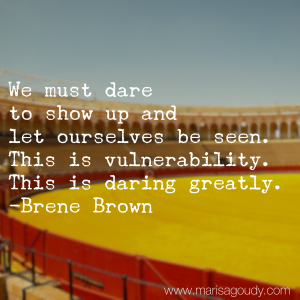 As a culture, we’re learning that vulnerability is vital to connection and growth. It’s an essential skill to master if you want to make the world more beautiful, bearable, and bold.
As a culture, we’re learning that vulnerability is vital to connection and growth. It’s an essential skill to master if you want to make the world more beautiful, bearable, and bold.
And yet, actually doing the stuff that puts your vulnerability skills to the test? Well, that’s another story.
Honoring your clients' vulnerability - and bravery
The client I quote above reminded me that sharing your writing - especially what Anne Lamott famously calls the “shitty first draft” - can be a terrifying experience.
Pressing “publish” and sending your words into the public arena isn’t the only thing that’s scary. Just sending it to someone who has earned your trust, like a writing coach, can give you the whim-whams.
Even if you want me to look more deeply at your writing. Even if you want me to question your logic and rework a paragraph that took you 45 minutes to write. Even when you trust me and trust our co-creative writing process, you still may shudder when I say "so, I read your piece..."
Almost everyone wrestles with the writing shame that was instilled in them by dismissive English teachers, unholy nuns, or grammarian grandmothers. I have to remind myself - often - that I’m pushing people into uncomfortable spaces by simply doing my job.
Are you in the vulnerability business too?
My dance with these beloved, vulnerable writers becomes even more complex since my clients themselves are in the vulnerability business.
And some of them never knew it was going to be part of the entrepreneurial ride.
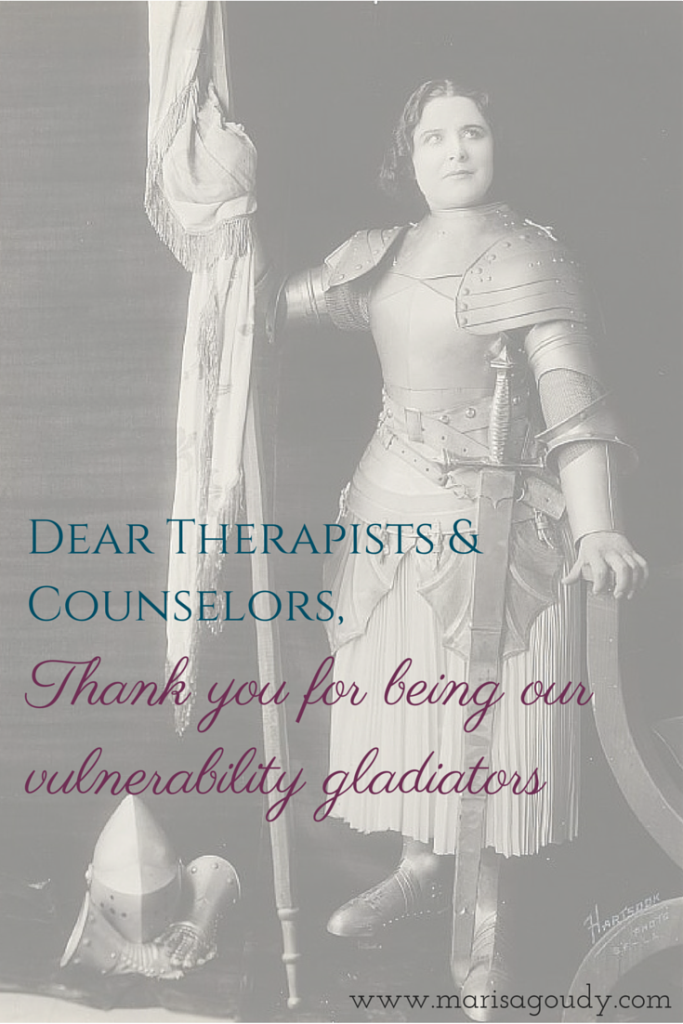 Therapists & Counselors, thank you for being our vulnerability gladiators
Therapists & Counselors, thank you for being our vulnerability gladiators
Therapists, of course, are schooled in the art and science of vulnerability. You specialize in emotional exposure - and how that tends to make people react or shut down.
Thank goodness we have you, dear counselors! I envision you there doing your brilliant work in the green room of the Daring Greatly "arena.”
Creative Entrepreneurs, you know you have a place in the arena too, right? Suit up!
And then there’s the rest of us creative entrepreneurs who learn from Brené Brown’s books. We look to the thought leaders (and bloggers!) who expose the crazy-sexy-scary underbelly of being alive and putting ourselves out there.
We creative entrepreneurs are not necessarily trained in the intricacies of the human psyche, but we still need to recognize we have a role to play in this arena.
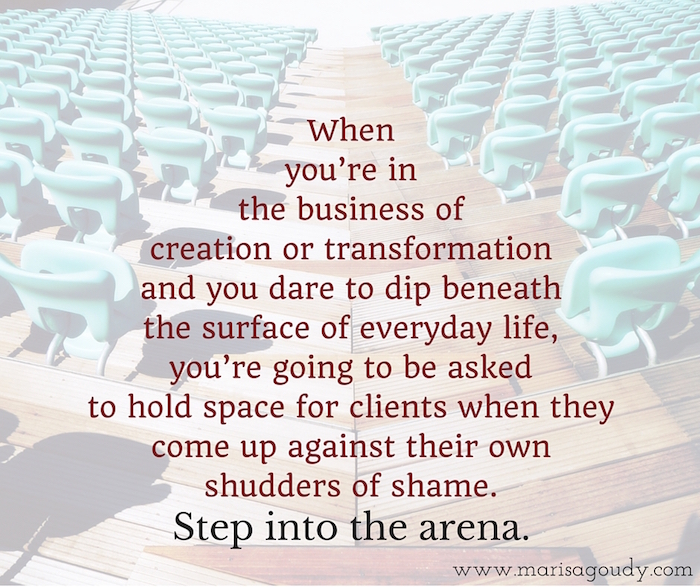 When you’re in the business of creation or transformation and you dare to dip beneath the surface of everyday life, you’re going to be asked to hold space for clients when they come up against their own shudders of shame.
When you’re in the business of creation or transformation and you dare to dip beneath the surface of everyday life, you’re going to be asked to hold space for clients when they come up against their own shudders of shame.
Support clients in their most vulnerable moments and help them make real, positive change… When you do that, you’re performing a service that’s so much more valuable than whatever you say you do on your website.
When you hold space in that way you’re creating a long term client and a forever fan.
How can you make vulnerability one of your greatest assets?
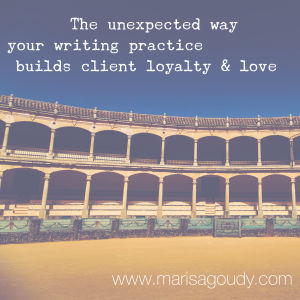 If being “that person” who can hold space for a client when she feels most exposed is how you earn the trust that builds a practice and a business, how can you get better at it?
If being “that person” who can hold space for a client when she feels most exposed is how you earn the trust that builds a practice and a business, how can you get better at it?
Start by recognizing what makes you feel vulnerable. Start with what feels risky. Start with your writing.
4 Key Lessons in Vulnerability You Can Learn From Your Own Writing Practice
- Recognize that you are stepping into the arena whenever you publish a blog post. Congratulate yourself for that.
- Realize that showing one focused reader something that you have written may feel a lot harder than sending it to a million faceless internet surfers.
- Acknowledge that your writer’s block is about more than time constraints and a hatred of grammar… it's likely rooted in that tricky mix of “please see me” and “eek! stop looking at me!”
- Notice when you’re asking your readers to be vulnerable. You’ll hone your vulnerability super powers when you become aware of the content that pushes readers out of their comfort zone.
Simply put, when you know your own vulnerabilities more intimately, you’ll be better able to detect them and honor them in others. People love it when you do that, you know. Think you might be ready to entrust me with your stories and your writing practice? Learn more about the writing coaching relationship.
I'll leave you with my favorite working definition of vulnerability by the brilliant Ahri Golden. Soak in these words. Put them into practice.
Vulnerability In the space between you and me Vulnerability is power Vulnerability in the space between you and me Vulnerability is the opposite of weak

